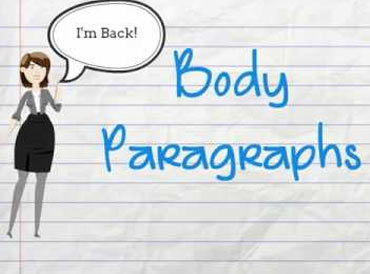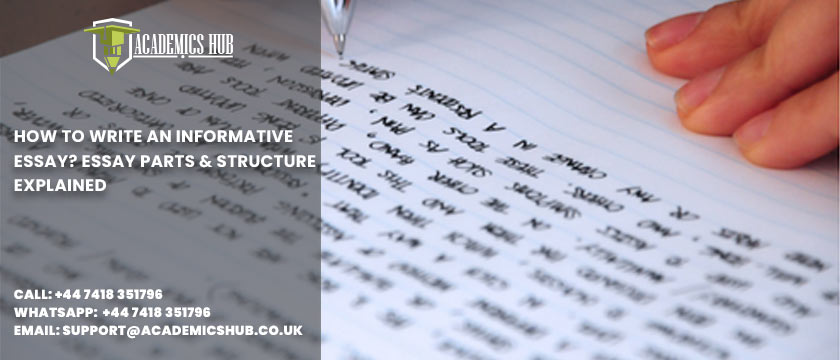One of the most nerve-wracking aspects of being a student is writing essays. An informative essay’s framework may appear simple at first, but these tasks are frequently more challenging than they appear. The goal of informative writing and an informative essay is to inform the reader on a particular topic. These essays allow you to talk about nearly anything, including people, places, and events. The key goal is to provide the information as succinctly and convincingly as possible. From essay structure to the theme and conclusion part, every aspect of writing an informative essay requires skill.
The first challenge for students while writing an informative essay is deciding which information to add, how to make them persuasive, and how to stay on topic. Finding reliable sources of information that are well-written, interesting, and accessible is another challenging task in today’s age of information overload. Because of this, being able to write an informative essay is a skill that you’ll find useful not only in school but also in many workplaces and when building your internet presence. Students often seek professional essay help so that they can score their best and ace their academic careers. Let’s understand what an informative essay is, how it should be formatted, and provide you with an outline, step-by-step instructions for essay parts, the structure and other good tips.
An Informative Essay:
A piece of writing with the objective of informing the reader about a topic, event, experience, business, product, or concept is known as an informative essay. An essay is supported by credible sources and is fact-based. It does not present a stance or attempt to persuade the reader through personal experiences or subjective opinions. Informative essays instruct a reader on the crucial details of a subject by frequently delving deeply into it and giving intriguing connections and data. The four primary genres of essays are narrative, descriptive, expository, and persuasive; however, informative essays can be any of the first three. This makes them relatively distinctive.
Many different types of essays can be categorized as informative essays because their sole purpose is to inform the reader. Since both expository and informative essays aim to inform the reader, they are most similar to one another. The primary distinction is that in an expository essay, the thesis statement normally aims to explain something rather than simply provide facts. Essays that are narrative or descriptive might be informative if they merely give facts to the reader without attempting to persuade them of anything.
Five Parts of Informative Essays:

When writing an essay, you’ll adhere to a predetermined format. Your essay can go from “excellent” to “amazing” if you are aware of the right essay structure and know how to use it to your advantage. A good essay should have an introduction, three body paragraphs, and a conclusion. Despite the structure’s seeming simplicity, it’s crucial to include each part’s various components. Let’s examine the essay parts in greater detail:
Introduction:
The reader gets their initial impression of your writing from the start of your essay. It will not just introduce your subject; it will also show the reader how your essay will be organized. As a result, it must capture their interest and concisely present your points. It accomplishes this by employing a thesis statement and an opening hook. For instance:
Hook: Why magical realism isn’t called fiction if it contains mythological themes?
Thesis assertion: Real situations, fanciful elements, and flexible chronological lines all contribute to mystical realism’s ability to convincingly merge the usual and extraordinary.
The opening hook and thesis statement are the two most crucial components, while additional components, such as a summary of the storyline, may also be included depending on the genre of the essay.
3 Body Paragraphs of An Informative Essay

The bulk of the essay is made up of body paragraphs. Why? Because you present and support your arguments or ideas with these. However, they must adhere to a set framework, just like an introduction, to prevent your essay from becoming ad hoc completely.
Strong Start
You should have at least three body paragraphs in an essay. Your strongest point is in the first paragraph in the body. Your next most compelling argument or point is presented in the second paragraph. Maintain this format until your final body paragraph, which should present your weakest argument. The best case for magical realism, to use an example, would be realistic locations, followed by fantastical components, and finally, flexible time constraints.
Utilize Relevant Research
In the majority of informative essays, you’ll need to provide solid evidence and examples to support your views and arguments. Even if your essay is the best in the world, if it is solely based on unreliable sources, your beautiful words will get wasted on the page. Therefore, in order to construct the strongest case possible, you must understand the distinction between primary and secondary sources. And use all the relevant and authentic information.
Topic Sentences
Essays ought to be fluid, like a brook bubbling over pebbles. Use topic sentences to help the words flow. These provide an overview of your paragraph’s subject matter. Then, to smoothly move from one argument to the next, employ transition words. Remember, when it comes to writing, don’t be a beaver. The flow of your essay can be disrupted if you don’t use topic sentences and transition words.
Final Part: The Conclusion
Your thesis is restated in conclusion. However, it’s crucial to avoid being overly intrusive when restating your thesis. Continue to be imaginative, just as you were in the introduction and body paragraphs. In a professional essay, the conclusion matters a lot as it wraps up your whole information in a few lines and gives the reader a complete idea about your content. Your introduction and closing paragraphs in an essay must be closely related. You address the precise subject you’ll be presenting for the reader throughout the introduction and give background information. You should refer readers to your original thesis statement and how you addressed it in the essay’s body in conclusion.
What Are the Four Basic Steps to Writing A Well-Structured Informative Essay?
You can complete your informative writing by following four important steps. As follows:

- Once you’ve selected a good topic, sit down and start your informative study. This entails compiling all pertinent information regarding the selected issue and arranging it in the most effective manner. Making a list of the things you already know and the things you don’t know much about your chosen topic matter, as well as a list of the questions you hope your research will help you answer, may be useful in planning the structure of your paper.
- You will then draft a content map. To accomplish this, you must organize all of the information you already know or have learned about the chosen or offered subject. Make sure your data are arranged according to the importance and provide space if further information or important points need to be included. For each of the key details that you will discuss in your essay’s body paragraphs, create a strong sentence statement.
- Make an essay outline to help you prepare to arrange your essential arguments in a sensible and understandable manner. You’ll soon begin working on your first draft. In this step, you need to focus on all essay parts, strictly follow the essay structure discussed above and use facts and arguments in the body. Excellent research is especially important for works that are meant to be educational in nature. You have an obligation to provide reliable information as you are the author. Be careful to exclusively cite reliable, objective sources—those produced by authors who are knowledgeable about the subject of your essay.
- Finally, after drafting your essay, editing it is the last stage. To do this, you can ask for essay help, or if no one else is available, read your essay aloud to yourself. In addition to gauging continuity and flow, it’s crucial to pay attention to grammar, spelling, and syntax. Make sure the material is accurately structured and presented in a clear, understandable manner as you finish your final text. Have a second reader go through your final draft to look for any grammar or spelling mistakes and to offer feedback.
Final Words
An informative essay’s goal is to inform or educate the reader on a certain concept or subject. A thorough comprehension of the subject is required in order to write a powerful paper. While being a true subject matter expert is not a requirement, having some understanding of the subject or at the very least having exceptional research abilities is. Knowing how to communicate facts clearly and succinctly is also useful. Despite the fact that writing an informative paper requires a lot of detail, using a logical approach and the tips mentioned above, you can definitely secure your success.
Now that you know how to write a good informative paper, use that knowledge! In this guide, it is thoroughly discussed what an essay is and how you can write an informative essay following the essay structure. If you have been given the assignment to write an informative paper but are unsure of what it entails, it could be good to follow the tips mentioned above or take essay help from the experts to write an essay effortlessly.

